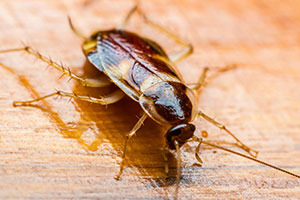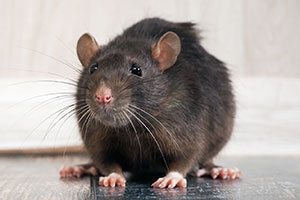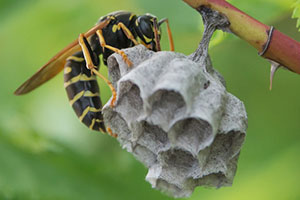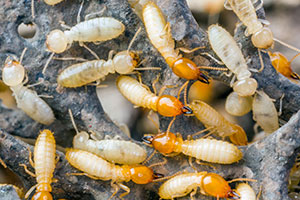Pest ID

Cockroaches
Damage
Cockroaches spread human disease by depositing disease organisms on food and utensils. The American cockroach, which comes into contact with human excrement in sewers or with pet droppings, may transmit bacteria that cause Salmonella and Shigella. German cockroaches are believed to be capable of transmitting disease-causing organisms such as Staphylococcus, Hepatitis, and Coliform bacteria. They also have been implicated in the spread of Typhoid and Dysentery.
Recent studies have found a strong association between the presence of cockroaches and increases in the severity of asthma symptoms in individuals who are sensitive to cockroach allergens, especially children.
Detection & Treatment
Cockroaches may become pests in homes, restaurants, hospitals, warehouses, offices, and virtually any structure that has food preparation or storage areas. These pests are common even in the cleanest of crowded urban areas and older dwellings. It's usually not difficult to discover an infestation, because they are often visible. Treatment usually involves sealing cracks and crevices to block entrance; keeping food and trash areas clean to avoid providing food; and the professional application of insecticide and bait on a regular basis.

Rodents
Damage
Rats, mice, squirrels and other rodents consume and contaminate food. They also gnaw on electrical wires, wooden structures, and tear insulation in walls and ceilings for nesting. Rodents can also transmit disease to humans, pets, and livestock. They have been found to transmit Typhus, Leptospirosis, Trichinosis, and Salmonellosis.
Rodent damage to sensitive attic structures is the primary reason to remove them quickly and permanently. Rodents chew and gnaw all the time. Rodents in the attic can destroy electric wires, air ducts, and plumbing. The threat to electrical wires is a serious fire hazard, and many unexplained fires are attributed to rodents in the attic.
Diseases
Rodent diseases include Hantavirus Pulmonary Syndrome, Rat-bite fever, and Leptospirosis. Rats in the attic leave behind droppings which breed bacteria. Rats in the attic can descend into kitchen and contaminate the home's food.
Why Do Rats Like My Attic?
Roof rats crave attics for three reasons:
- Warmth: Roof rats are tropical animals and crave warmth. When nighttime temperatures drop below 70 F, roof rats are driven to seek a warmer environment.
- Mating Opportunities: Nothing attracts a rat like a rat. An attic that has an active rat problem or even a past rat problem will carry a rat scent. Other rats in the vicinity will be driven to join these rats.
- Safety: Attics are free of predators. Like all other animals, rats avoid danger for themselves and their offspring by seeking shelter from predators inside the attic.
The presence of mice and rats is usually detected by the damage they cause to food and structures, by their droppings, and by their nests. Treatment involves eliminating all entry points and population reduction by the application of rodenticides and traps.

Ants
Damage
Ants cause various types of damage, depending upon the variety. Carpenter ants tunnel through wood, destroying structures. Pharaoh ants may transmit serious diseases. A fire ant's sting is potentially deadly to susceptible individuals, and all ants contaminate the food they infest.
Detection & Treatment
Ants build massive colonies, so their presence is generally detected when you see their nests, or the ants themselves. Treatments involve baiting, insecticide, and sealing off entry to buildings.

Spiders
Except for poisonous spiders, such as the black widow and the brown recluse, spiders are not harmful to humans. When it's important to control spiders, chemical control is used, along with destruction of webs and eggs. Since they feed on insects, measures that control unwanted insects will also reduce spider populations.

Biting & Stinging Pests
Damage
Bees, wasps and scorpions are dangerous because of their painful and potentially harmful stings.
Detection & Treatment
Wasp nests and beehives can be removed by professionals with protective gear. Insecticides are also used. Scorpion problems are usually treated chemically.

Termites
Termites eat wood and can consequently cause great structural damage to your home if left unchecked. A typical homeowner’s insurance policy does not cover destruction caused by termites, even though they cause over 2 billion dollars in damage to homes throughout the United States each year. Our inspection and treatment program can help you understand the threat of termites and take the necessary steps to protect your home.
Damage
Subterranean termites are extremely destructive. First, they build tunnels to wooden structures, and then they burrow into those structures to obtain food. Any wood or cellulose-containing material constitutes termite food, and given time to do so, they'll eat until nothing is left but a shell. Termites avoid light and air, so they build their colonies where you're not likely to stumble upon them.

Bed Bugs
Bed bugs are small, wingless insects that feed on blood from animals or people. Bed bugs get their name because they like to hide in bedding and mattresses, but bed bugs can live on luggage, clothing, carpets and just about any place where humans are regularly present. They are nocturnal and very hardy with the ability to live for months without a meal. They travel well, actively hitchhiking on clothes, luggage and furniture until they find a new source of food.
How can you spot bed bugs?Bed bugs are small black or reddish insects, about a ¼ inch long, with a broad oval shape and small head. Before feeding, they are flat. After a meal of human or animal blood, they become swollen and elongated.
Most people become aware of bed bugs after they are bitten, and the bite marks appear on their skin. Some people notice small blood stains on their bedding from where the bed bug bit them. They will typically feed on people's arms or shoulders, though any area of exposed skin can be a target. Bed bugs also can be detected by looking for their droppings – small, dark flecks left on sheets, floors, walls, furniture or clothes as the bed bugs are crawling to hiding spots.
They are often incorrectly associated with unclean conditions, but the truth is bed bugs can be found anywhere they find a reliable population of hosts (human or animal) and some cover to hide in while they are digesting or waiting for a host.
What should I do if I think I have bed bugs?If you spot bed bugs or start noticing insect bites on your skin (often several bites in a straight line), call a pest control professional immediately. These are difficult insects to eradicate and most do-it-yourself measures will fall short of eliminating or controlling a population once they become established. Pest control companies will work to create an eradication plan that is right for your dwelling and your family.
How can I prevent bed bugs?No measure is foolproof, but take the following steps to reduce your chances of becoming a bed bug target.
When staying at a hotel use the luggage rack provided for your suitcase, and when possible, avoid placing your clothing in drawers.
Check your luggage for visible signs of these pests upon returning from any trip. Bed bugs will attach themselves to luggage in hotels and office buildings and can travel for days to get to a safe location where they can feed on hosts. Shake out and thoroughly vacuum any bags or pocketbooks outside your home upon returning from any trips.
Thoroughly and frequently vacuum your carpets, furniture (made of any material), your bed (especially the seams of your mattress), behind picture frames, along baseboards, and any other nook or cranny where a small insect can hide. Empty the vacuum cleaner bag thoroughly EACH TIME YOU VACUUM into a plastic trash bag outside your home. Tie the trash bag up extremely well and secure it in a covered trash can outdoors.
Call a pest control professional immediately. Only they can accurately detect the extent of a bed bug infestation and can safely apply the pesticides needed to get rid of these stubborn insects.
What should I not do?Don't attempt to use a "bug bomb" (long release aerosol pesticides) yourself to eradicate bed bugs. Consumers may put themselves in danger if they overuse pesticides in the home. These creatures are quite elusive and will require professional attention.
Don't hire anyone promising a miracle fix for bed bugs or anyone claiming they have access to special chemicals to treat bed bugs. Some unscrupulous individuals are preying on people's strong distaste with the idea of bed bugs to make a quick buck with unproven treatment strategies or by using pesticides that are not approved or may be dangerous when used indoors.
What is the danger, if any?Bed bugs and their feeding habitats have not been linked to nor have they been reported to cause any direct health problems for humans. But their droppings can trigger asthma attacks in susceptible individuals. Their bites are also quite itchy so treat that symptom, especially with children, so bite marks don't become infected from excess scratching. Bedbug bites can be painful especially if you suffer multiple bites as is common with an infestation. There can also be a strong unpleasant smell associated with bed bugs. The noxious odor comes from either high quantities of their fecal matter or from active scent glands present on some bed bug species.


